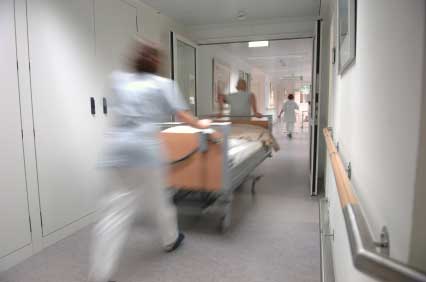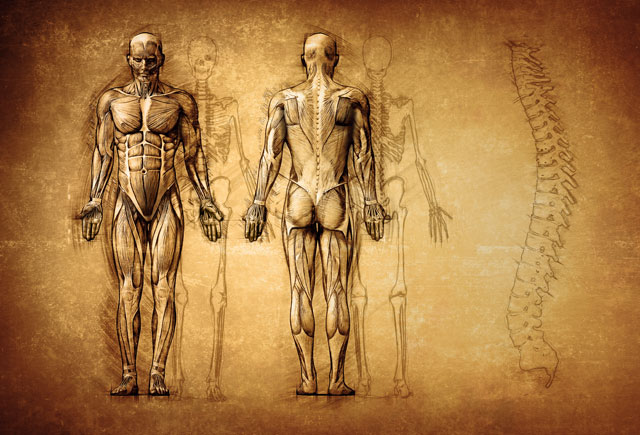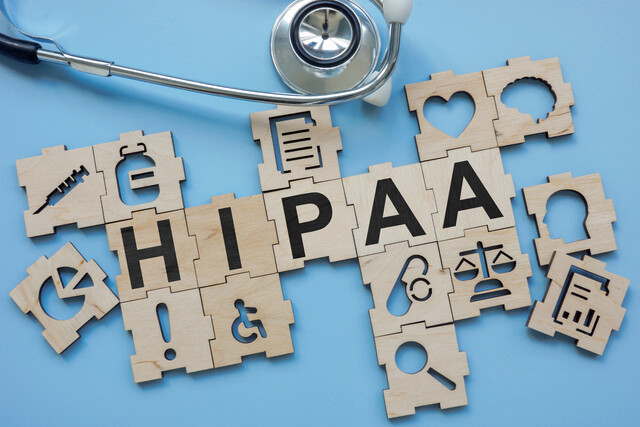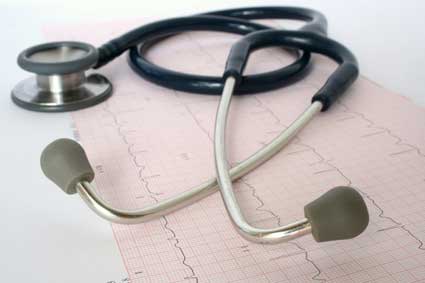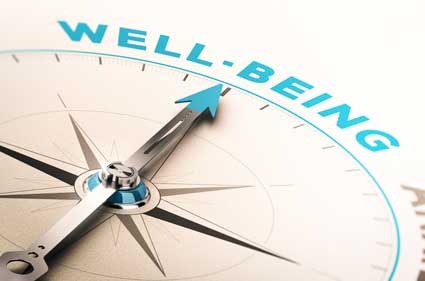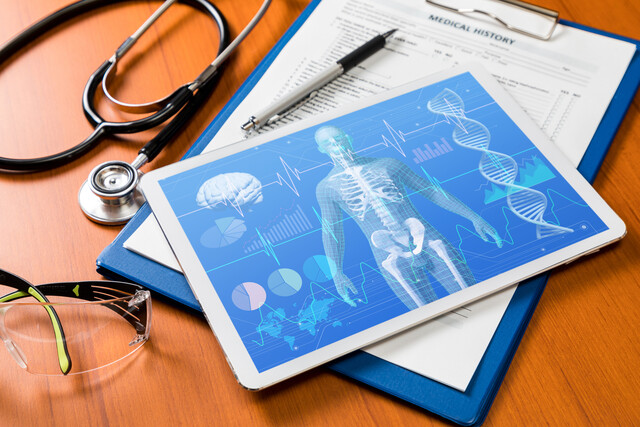In order to properly care for patients, you need to understand the basics of anatomy and health. These are the basis for everything you do, from assisting patients with personal hygiene to monitoring vital signs. Without understanding how the human body works, you can't truly understand what you are doing and why you are using a particular approach.
Human Anatomy
Every patient's health and well-being depends upon the health care provider's understanding of human anatomy. As a nursing assistant, it is essential that you learn the basics of human organ systems, tissues and cells so that you know what to look for in patients -- each of these provide clues as the person's relative health.
Skeletal System
Organ Systems
The major organ systems of the body do everything from digest the food we eat to provide protection to the other organs and aid in respiration. Understanding what comprises each of the major organ systems will help you care properly for your patients.
The major organ systems include the Nervous System, Cardiovascular System, Respiratory System, Digestive System, Urinary System, Reproductive System and the Skin. Each of these systems serves a particular function that is essential to human survival.
Nervous System
The nervous system transmits nerve impulses to the brain, where it is then translated into sensations such as pain, pleasure, hot and cold. The brain is also part of this complex system and is the "clearing house" for all sensation, feeling and emotion. The brain also regulates memory and intelligence. Without brain function, a person's other organs will shut down and life will cease unless it is preserved by artificial means.
The main components of the nervous system are the brain and spinal cord. The spinal cord is a complex bundle of nerve fibers that are encased in the spinal column (made up of the vertebrate of the spine, or backbone) for protection. The brain is encased in a thick membrane beneath the skull for protection, and is cushioned by cerebrospinal fluid.
Cardiovascular System
The Cardiovascular system involves the heart and lungs as well as blood vessels and blood itself, and is responsible for getting blood to and from the lungs for the exchange of oxygen in the blood stream. Without a steady supply of fresh oxygen in the lungs to exchange with CO2 in "old blood" as it is pumped through the heart, illness and death will occur.
The right side of the heart takes in deoxygenated blood though the veins. It pumps this blood to your lungs where it will receive more oxygen through exchange taking place in the alveoli (tiny air sacs in the lungs). This oxygenated blood then returns to the left side of the heart and is then pumped it out to the rest of the body through the arteries.
Cardiovascular II -- The Respiratory System
Where does the oxygen come from that the heart transmits to the blood stream? From respiration -- the intake of oxygen through the lungs. The respiratory system exchanges CO2 for oxygen with each breath you exhale and inhale. When exhaling, the excess carbon dioxide that has accumulated in the blood stream is released, and you then inhale fresh oxygen that will be transported to the heart to be sent back into the bloodstream. All of this oxygen exchanges takes place in the alveoli.
When you inhale, air passes into the trachea (what most people know as the windpipe) and into each lung. To get to the lungs, the air will pass through the bronchial tubes. These tubes branch into bronchioles, then continue branching until the end up as the tiny air sacs (alveoli) mentioned earlier. After the oxygen exchange takes place at this level, exhalation flushes the carbon dioxide out of your lungs.
Many nursing assistants will work extensively with the elderly. It is important to know that respiratory system complications are among the most common problems you will encounter with frail or elderly patients, including such illnesses as pneumonia and chronic bronchitis. We will discuss these in greater detail later. For now, remember that monitoring and being aware of the delicacy and importance of the respiratory system is essential.
Digestive System
The digestive system runs, quite literally, through the entire body. It begins with the pharynx, or throat, where food begins its journey through the digestive tract, and ends with the rectum, where waste products are eliminated as feces. The organs involved in the digestive system include:
- Pharynx
- Esophagus
- Stomach
- Small Intestine
- Colon (Large Intestine)
- Liver
- Gall Bladder
- Rectum
These organs aren't in a straight path -- the gall bladder and liver lie "along the route" and contribute specific functions to the digestive process. The liver produces cholesterol, filters toxins out of the blood, produces bile to help in digestion, controls blood sugar and produces certain essential components of the immune system. It is located on the right side of the body beneath the rib cage. Two of the most common problems with the liver are either improper regulation of blood sugars or permanent liver damage caused by excess alcohol or drug use.
The gall bladder is a small sac below the liver that also produces bile that the body uses in digestion. It is an important organ, but you can live a relatively normal life without one, although you would have to watch your diet carefully and take supplements to aid in digestion. In the United States, several hundred thousand individuals have their gall bladder removed every year because it isn't functioning properly, and in many cases, causing painful gall stones.
Urinary System
After your body has taken what it needs from the food, waste products are left behind. The urinary system is one way the body eliminates waste, similar to the manner in which the lungs eliminate carbon dioxide from the blood stream. Proper kidney function keeps the various chemicals and water in your body balanced. Adults eliminate about a quart and a half of urine each day. The amount depends on many factors, especially the amounts of fluid and food a person consumes and how much fluid is lost through sweat and breathing. Certain types of medications can also affect the amount of urine produced by the body.
Urea is produced when foods containing protein, such as meat, poultry, and certain vegetables, are broken down in the body. Urine is the way your body excretes this urea from the body after it has been carried by the bloodstream to the kidneys. The kidneys release small amounts of urine periodically throughout the day and night. This travels to the bladder, which fills up over time until you get the sensation of your bladder being "full," and you have the urge to urinate.
As a nursing assistant one of your most important jobs will be assisting patients who need to void (or empty) their bladder. You will often get called or paged by a patient who has a sudden urge to go to the bathroom when you are in the middle of another assigned task. Managing your duties appropriately is one of the challenges of being a nursing assistant. Keep in mind that patients often have more difficulty than the average person controlling bladder urges, so waiting until you arrive may be very difficult if it takes you more than a few minutes.
When a patient cannot promptly empty a full bladder, whether in the restroom or with the assistance of a bed pan, they can have accidents that are embarrassing for them and a great deal of work for you. Urine can also back up into the kidneys if a full bladder is ignored for too long, which may lead to either a kidney or bladder infection. Both of these are painful and require prescription medications for proper treatment; they will also increase the likelihood of future bouts of incontinence.
Skin
- Holding organs and tissues in place
- Protecting delicate organs and tissues
- Regulating body moisture
- Regulating body temperature
- Keeping infection out of the body
Many patients lose (either temporarily or permanently) some of the essential properties that make skin so effective in regulating temperature and moisture. For instance, elderly patients have skin that is less elastic which doesn't respond as well to colder temperatures causing them to chill easily. In other patients, some medications may inhibit the skin's ability to produce sweat, which helps cool the body through evaporation. In these cases, high fevers can result.
Nursing assistants should monitor the condition of patients' skin carefully and make sure it is hydrated and free of wounds at all times.
Bruising
Some causes of bruising you should be aware of include:
- Certain medications, including aspirin, certain arthritis medications and anti-inflammatories.
- Leukemia and other forms of cancer.
- Pressure from being in one position too long, particularly in bed-ridden patients and the elderly.
- Abuse
Loss of Appetite
- Emotional distress
- Appetite suppressant effect found in certain medications
- HIV infection or AIDS
- Pregnancy
- Cancer
- Infections (acute or chronic)
Skin Lesions or Ulcers
Skin ulcers can develop in patients who are bed-ridden for long periods of time if they are not given plenty of range of motion (ROM) exercise and are not turned and repositioned at least every two hours during the day. These ulcers can also form if an individual has poor circulation due to diabetes and other illnesses that cause damage to the circulatory system. In diabetics, skin ulcers or lesions are particularly common in the lower extremities and on the feet.
Charting the appearance and stage of any ulcers on a patient is very important, as it indicates how severe the condition is and whether it is responding to treatment. Skin ulcers can be resistant to treatment, so as a nursing assistant, you must be vigilant in dressing the wounds, keeping track of their improvement or lack of improvement and checking for them on patients who are at risk. Some skin ulcers develop secondary yeast or fungal infections.
The Merck Scale for Skin Ulcer Classification:
Stage 1 -- Redness of the skin with the tissue being soft to the touch. The skin will become redder and irritated with pressure.
Stage 2 -- Swelling sets in along with a slight toughening of the skin around the edges of the lesion. You may notice that some of the top layers of skin will begin to peel.
Stage 3 -- Necrosis sets in. Necrosis is the death of skin tissue, and can eat away the skin right through the fatty tissue layer.
Stage 4 -- Necrosis continues, now destroying fatty tissue and possibly exposing muscle tissue beneath.
Stage 5 -- Continuing necrosis with destruction of some muscle tissue. The skin ulcer will have become quite enlarged in most cases.
Stage 6 -- Bone damage begins, resulting in permanent damage. At this point, the infection will generally become widespread, leading to joint sepsis or general septicemia (a generalized body infection).
A later chapter will cover the care and dressing of skin ulcers when they do occur. Once a patient has developed skin ulcers, they usually take some time to heal, so proper care and dressing of the wound is extremely important.
Incontinence
Loss of bladder control is not a disease and it is not something that patients can control-- it is a symptom that cannot be regulated. It can also be one of the most frustrating challenges for a nursing assistant, particularly in a long-term care or nursing home facility, where it is likely you will frequently cope with patients who are incontinent.
When you are in the middle of a task that you can't immediately leave and a patient has to void his or her bladder, it can be frustrating when you arrive only a few minutes late to find that they have wet the bed. Do not let this upset you -- remember, the patient did not intentionally decide to wet their bed. Patients with certain diseases or who are advanced in age often are hit by a sudden and overwhelming urge to urinate that they cannot control no matter how hard they try. Keep in mind that as much as this might require you to do some extra work, it is surely much more of an embarrassment for the patient.
Incontinence may be the result of:
- Excess fluid intake
- Certain medications
- Kidney or bladder infection
- Prostate or bladder cancer
- Enlarged prostate
- Neurological illnesses (including Parkinson's or Alzheimer's)
- Depression or disorientation
There are three key elements to handling an incidence of incontinence with a patient:
- Be sure to always inform the charge nurse and record the incident in the patient's chart, particularly if this is an unusual occurrence. Incontinence can be a symptom of an underlying, more serious problem.
- Immediately change the linens on the bed to provide a clean, dry resting place for your patient. At this time you must also wash the patient thoroughly and change his or her clothing so that he or she is not left with his own urine irritating their skin.
- Restore your patient's dignity as much as possible. Reassure him or her that you are not upset and let him or her know that you sympathize. Do not place blame, and be sure to downplay the incident.





